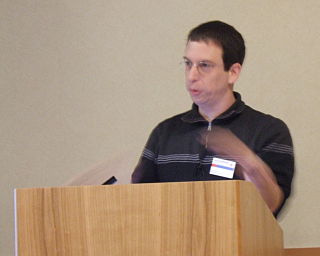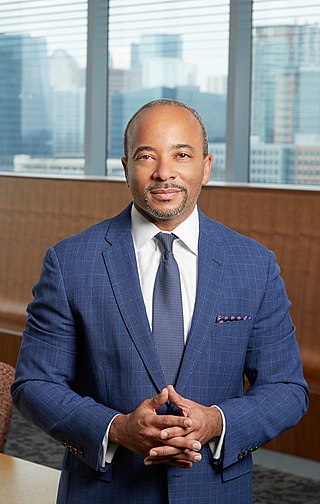
Alan Curtis Kay is an American computer scientist best known for his pioneering work on object-oriented programming and windowing graphical user interface (GUI) design. At Xerox PARC he led the design and development of the first modern windowed computer desktop interface. There he also led the development of the influential object-oriented programming language Smalltalk, both personally designing most of the early versions of the language and coining the term "object-oriented." He has been elected a Fellow of the American Academy of Arts and Sciences, the National Academy of Engineering, and the Royal Society of Arts. He received the Turing award in 2003.
Software engineering is an engineering-based approach to software development. A software engineer is a person who applies the engineering design process to design, develop, maintain, test, and evaluate computer software. The term programmer is sometimes used as a synonym, but may emphasize software implementation over design and can also lack connotations of engineering education or skills.

David A. Bader is a Distinguished Professor and Director of the Institute for Data Science at the New Jersey Institute of Technology. Previously, he served as the Chair of the Georgia Institute of Technology School of Computational Science & Engineering, where he was also a founding professor, and the executive director of High-Performance Computing at the Georgia Tech College of Computing. In 2007, he was named the first director of the Sony Toshiba IBM Center of Competence for the Cell Processor at Georgia Tech.

Carnegie Mellon Silicon Valley is a degree-granting branch campus of Carnegie Mellon University located in the heart of Silicon Valley in Mountain View, California. It was established in 2002 at the NASA Ames Research Center in Moffett Field.
Mutation testing is used to design new software tests and evaluate the quality of existing software tests. Mutation testing involves modifying a program in small ways. Each mutated version is called a mutant and tests detect and reject mutants by causing the behaviour of the original version to differ from the mutant. This is called killing the mutant. Test suites are measured by the percentage of mutants that they kill. New tests can be designed to kill additional mutants. Mutants are based on well-defined mutation operators that either mimic typical programming errors or force the creation of valuable tests. The purpose is to help the tester develop effective tests or locate weaknesses in the test data used for the program or in sections of the code that are seldom or never accessed during execution. Mutation testing is a form of white-box testing.

The B. Thomas Golisano College of Computing and Information Sciences is one of the largest colleges at the Rochester Institute of Technology (RIT), and is home to the institute's computing education and research facilities. Golisano College is home to RIT's computer science, computing security, information sciences and technologies, and software engineering departments, and to the Ph.D. program in computing and information sciences, and the School of Interactive Games & Media. Golisano College is housed in a 125,000 square foot facility, opened in 2003 on RIT's campus in Rochester, New York.

The College of Computer Studies (CCS) is one of the eight colleges of De La Salle University. It was established in 1981 as the Center for Planning, Information, and Computer Science offering only a Bachelor of Science degree in Computer Science. The department was formally declared as a college in 1984. In 1990, the college was transferred to its new building, the INTELLECT Building, which was eventually renamed as the Gokongwei Building. In 1996 the college was granted semi-autonomous status along with the Graduate School of Business which led to the establishment of De La Salle-Professional Schools, Inc. The college became a part of De La Salle Professional Schools but later transferred back to the university.

Dan Boneh is an Israeli-American professor in applied cryptography and computer security at Stanford University.

The College of Computing is a college of the Georgia Institute of Technology, a public research university in Atlanta, Georgia. It is divided into four schools: the School of Computer Science, the School of Interactive Computing, the School of Computational Science & Engineering, and the School of Cybersecurity and Privacy. The College of Computing's programs are consistently ranked among the top 10 computing programs in the nation. In 2022, U.S. News & World Report ranked the Computer Science graduate program #6 in the U.S. In 2016, Times Higher Education and the Wall Street Journal ranked the College #5 in the world.
James David Foley is an American computer scientist and computer graphics researcher. He is a Professor Emeritus and held the Stephen Fleming Chair in Telecommunications in the School of Interactive Computing at Georgia Institute of Technology. He was Interim Dean of Georgia Tech's College of Computing from 2008–2010. He is perhaps best known as the co-author of several widely used textbooks in the field of computer graphics, of which over 400,000 copies are in print and translated in ten languages. Foley most recently conducted research in instructional technologies and distance education.
Burton S. "Burt" Kaliski, Jr. is a cryptographer, who is currently the chief technology officer (CTO) and senior vice president at Verisign. Before joining Verisign in 2011, he was the founding director of the EMC Innovation Network at EMC Corporation since its 2006 acquisition of RSA Security where he was Chief Scientist for RSA Laboratories. His notable work includes the development of such public key cryptography standards as PKCS and IEEE P1363, the extension of linear cryptanalysis to use multiple approximations, and the design of the block cipher Crab.
Richard Jay Lipton is an American computer scientist who is Associate Dean of Research, Professor, and the Frederick G. Storey Chair in Computing in the College of Computing at the Georgia Institute of Technology. He has worked in computer science theory, cryptography, and DNA computing.

Gregory Dominic Abowd is a computer scientist best known for his work in ubiquitous computing, software engineering, and technologies for autism. He currently serves as the Dean of the College of Engineering and Professor of Electrical and Computer Engineering at Northeastern University. Previously he was the J.Z. Liang Professor in the School of Interactive Computing at the Georgia Institute of Technology, where he joined the faculty in 1994.

Annie Antón is an academic and researcher in the fields of computer science, mathematical logic, and bioinformatics.

Stephen Edward Cross is the executive vice president for research (EVPR) at the Georgia Institute of Technology (Georgia Tech), a position to which he was appointed in 2010. As EVPR, Cross coordinates research efforts among Georgia Tech's colleges, research units and faculty; and provides central administration for all research, economic development and related support units at Georgia Tech. This includes direct oversight of Georgia Tech's interdisciplinary research institutes, the Georgia Tech Research Institute (GTRI), the Enterprise Innovation Institute (EI2) and the Georgia Tech Research Corporation (GTRC).
A Bachelor of Science in Information Technology,, is a bachelor's degree awarded for an undergraduate program in the information technology. The degree is normally required in order to work in the Information technology industry.

Peter A. Freeman is the founding dean of Georgia Tech's College of Computing, a position he held from 1990 to 2002. Freeman was assistant director of the National Science Foundation from 2002 to 2007.

Raheem Beyah is an American computer engineer, researcher, and educator. As of January 15, 2021 he is the Dean of the College of Engineering and Southern Company Chair at the Georgia Institute of Technology. Prior to becoming the Dean, he was the vice president for Interdisciplinary Research and the Motorola Foundation Professor and the executive director of Georgia Tech's online masters in cyber security program. Beyah is also the co-founder and chair of industrial security company Fortiphyd Logic, Inc.
The School of Cybersecurity and Privacy (SCP) is an academic unit located within the College of Computing at the Georgia Institute of Technology. This interdisciplinary unit draws its faculty from the College of Computing as well as the College of Engineering, the School of Public Policy, the Sam Nunn School of International Affairs, the Scheller College of Business, and the Georgia Tech Research Institute (GTRI). Faculty are engaged in both research and teaching activities related to computer security and privacy at the undergraduate and graduate levels. The school's unifying vision is to keep "cyberspace safer and more secure."












